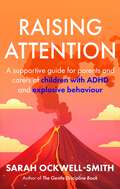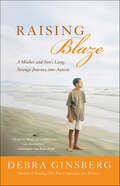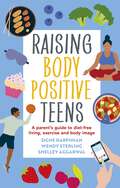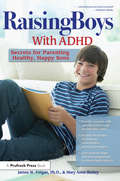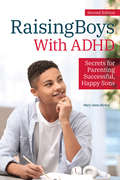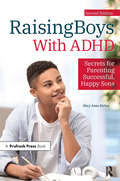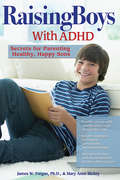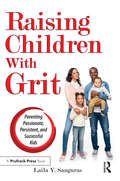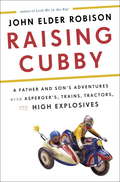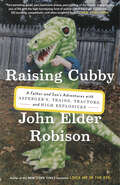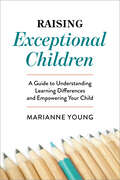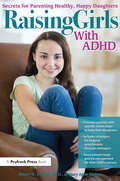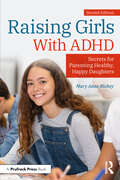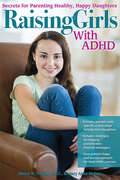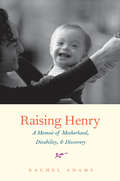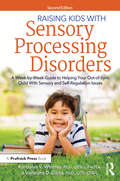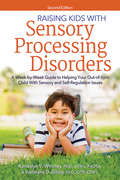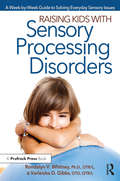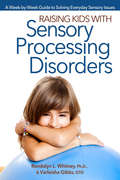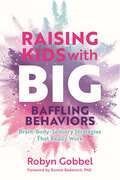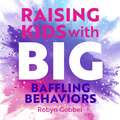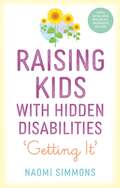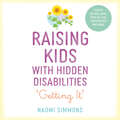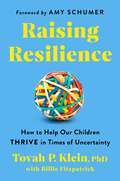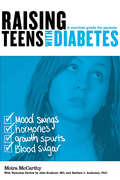- Table View
- List View
Raising Attention: A supportive guide for parents and carers of children with ADHD and explosive behaviour
by Sarah Ockwell-SmithA book for anybody who has, or works with, children (of any age) with 'out of control' behaviour, including parents, teachers and healthcare professionals. Raising Attention busts commonly believed myths surrounding ADHD and 'naughty' children, discusses up to date neuroscience and genetics research in an accessible way and provides practical tips that really make a difference to both children and the adults who care for them.Written by bestselling childcare expert Sarah Ockwell-Smith, herself a mother of a young adult with ADHD, there are plenty of heartwarming and heartbreaking personal stories included to bring the book to life.If you've ever felt exhausted, helpless, guilty, embarrassed or shamed for your child's behaviour, this supportive and non-judgemental book is for you.
Raising Blaze: A Mother and Son's Long, Strange Journey into Autism
by Debra GinsbergWhen you have a child that doesn't fit in, what do you do? Debra Ginsberg knew that her son, Blaze, was unique from the moment he was born in 1987. What she didn't know was that Blaze's differences would be regarded by the outside world not as gifts, but as impediments to social and academic success. Blaze never crawled. He just got up and walked when he turned one. He called his mother 'Zsa Zsa' until he was three. By kindergarten, he loved the music of Miles Davis and Ella Fitzgerald. He fears butterflies and is fascinated by garbage trucks. With the same honesty that made Waiting a success, Raising Blaze: Bringing Up an Extraordinary Son in an Ordinary World chronicles Debra's experience in raising a child who has defied definition by the host of professionals who have sought to label his differences. Ginsberg introduces us to a remarkable child and her own unusual childhood. She writes about a family which shows us the redemptive power of faith, humour and love.
Raising Body Positive Teens: A Parent’s Guide to Diet-Free Living, Exercise, and Body Image
by Shelley Aggarwal Signe Darpinian Wendy SterlingIn a world fraught with diet-culture and weight stigma, many parents worry about their child's relationship with their body and food. This down-to-earth guide is an invaluable resource allowing parents to take proactive actions in promoting a friendship with food, and preventative actions to minimize the risk factors for the development of eating disorders, particularly when early signs of disordered eating, excessive exercise, or body dissatisfaction have been noticed. It provides clear strategies and tools with a practical focus to gently encourage parents and teens to have a healthy relationship with food and exercise by centralizing joy and health. Coming from a therapist, a dietician, and an adolescent medicine physician, with insightful case studies from an array of young people from different backgrounds, this multidisciplinary author team delivers friendly, strategic guidance based in a wealth of expertise.
Raising Boys With ADHD: Secrets for Parenting Healthy, Happy Sons
by Mary Anne Richey James W. ForganWritten by two professionals who have "been there and done that" with their own sons with ADHD, Raising Boys With ADHD empowers parents to help their sons with ADHD find success in school and beyond. The book covers topics not often found in other parenting guides such as the preschool years and early diagnosis and strategies for teens transitioning to work and college. Filled with practical knowledge, resources, and tools needed to help parents address the many strengths and challenges of boys with ADHD, this book provides parents with encouragement and hope for the future.
Raising Boys With ADHD: Secrets for Parenting Successful, Happy Sons
by Mary Anne RicheyThe second edition of the best-selling Raising Boys With ADHD features the latest information on research and treatment for boys with ADHD. This book:Empowers parents to help their sons with ADHD find success in school and beyond.Covers topics not often found in other parenting guides.Provides a strength-based approach to helping boys discover their strengths and abilities.Helps boys become motivated, successful, and independent adults.Discusses the preschool years, early diagnosis, and strategies for teens transitioning to work and college.Filled with practical knowledge, a dynamic action planning guide, resources, and tools needed to help parents address the many strengths and challenges of boys with ADHD, this book provides parents with encouragement and hope for the future.
Raising Boys With ADHD: Secrets for Parenting Successful, Happy Sons
by Mary Anne RicheyThe second edition of the best-selling Raising Boys With ADHD features the latest information on research and treatment for boys with ADHD. This book:Empowers parents to help their sons with ADHD find success in school and beyond.Covers topics not often found in other parenting guides.Provides a strength-based approach to helping boys discover their strengths and abilities.Helps boys become motivated, successful, and independent adults.Discusses the preschool years, early diagnosis, and strategies for teens transitioning to work and college.Filled with practical knowledge, a dynamic action planning guide, resources, and tools needed to help parents address the many strengths and challenges of boys with ADHD, this book provides parents with encouragement and hope for the future.
Raising Boys with ADHD: Secrets for Parenting Healthy, Happy Sons
by James Forgan Mary Anne RicheyWritten by two professionals who have "been there and done that" with their own sons with ADHD, "Raising Boys With ADHD" empowers parents to help their sons with ADHD find success in school and beyond. The book covers topics not often found in other parenting guides such as the preschool years and early diagnosis and strategies for teens transitioning to work and college. Filled with practical knowledge, resources, and tools needed to help parents address the many strengths and challenges of boys with ADHD, this book provides parents with encouragement and hope for the future.
Raising Children With Grit: Parenting Passionate, Persistent, and Successful Kids
by Laila SangurasGrit, the combination of passion and perseverance, has more of an influence on success than cognitive ability, and parents want nothing more than to raise happy, successful children. Raising Children With Grit: Parenting Passionate, Persistent, and Successful Kids provides the strategies that parents need to teach, motivate, and inspire children to pursue their passions with grit—and succeed. And by focusing on self-discipline, parenting strategies, and personality traits, parents can cultivate perseverance in their children. By coupling that with an emphasis on curiosity and interest-building activities, parents can help their children define their passions. Additionally, this book offers tips for parents about working with school personnel, how to model grit in their own lives, and how social factors can influence the development of grit.
Raising Cubby
by John Elder RobisonThe slyly funny, sweetly moving memoir of an unconventional dad's relationship with his equally offbeat son--complete with fast cars, tall tales, homemade explosives, and a whole lot of fun and trouble Misfit, truant, delinquent. John Robison was never a model child, and he wasn't a model dad either. Diagnosed with Asperger's syndrome at the age of forty, he approached fatherhood as a series of logic puzzles and practical jokes. When his son, Cubby, asked, "Where did I come from?" John said he'd bought him at the Kid Store and that the salesman had cheated him by promising Cubby would "do all chores." He read electrical engineering manuals to Cubby at bedtime. He told Cubby that wizards turned children into stone when they misbehaved. Still, John got the basics right. He made sure Cubby never drank diesel fuel at the automobile repair shop he owns. And he gave him a life of adventure: By the time Cubby was ten, he'd steered a Coast Guard cutter, driven a freight locomotive, and run an antique Rolls Royce into a fence. The one thing John couldn't figure out was what to do when school authorities decided that Cubby was dumb and stubborn--the very same thing he had been told as a child. Did Cubby have Asperger's too? The answer was unclear. One thing was clear, though: By the time he turned seventeen, Cubby had become a brilliant chemist--smart enough to make military-grade explosives and bring state and federal agents calling. Afterward, with Cubby facing up to sixty years in prison, both father and son were forced to take stock of their lives, finally coming to terms with being "on the spectrum" as both a challenge and a unique gift. By turns tender, suspenseful, and hilarious, this is more than just the story of raising Cubby. It's the story of a father and son who grow up together. Praise for John Robison's first book, Look Me In the Eye:"Lean, powerful in its descriptive accuracy and engaging in its understated humor...Emotionally gripping." --Chicago Tribune"A fantastic life story told with grace, humor, and a bracing lack of sentimentality." --Entertainment Weekly"Endearing...Robison is a natural storyteller." --Boston Globe
Raising Cubby: A Father and Son's Adventures with Asperger's, Trains, Tractors, and High Explosives
by John Elder RobisonThe slyly funny, sweetly moving memoir of an unconventional dad's relationship with his equally offbeat son--complete with fast cars, tall tales, homemade explosives, and a whole lot of fun and trouble John Robison was not your typical dad. Diagnosed with Asperger's syndrome at the age of forty, he approached fatherhood as a series of logic puzzles and practical jokes. Instead of a speech about the birds and the bees, he told his son, Cubby, that he'd bought him at the Kid Store--and that the salesman had cheated him by promising Cubby would "do all chores." While other parents played catch with their kids, John taught Cubby to drive the family's antique Rolls-Royce. Still, Cubby seemed to be turning out pretty well, at least until school authorities decided that he was dumb and stubborn--the very same thing John had been told as a child. Did Cubby have Asperger's too? The answer was unclear. One thing was clear, though: By the time he turned seventeen, Cubby had become a brilliant and curious chemist--smart enough to make military-grade explosives and bring federal agents calling. With Cubby facing a felony trial--and up to sixty years in prison--both father and son were forced to take stock of their lives, finally accepting that being "on the spectrum" is both a challenge and a unique gift.nd a bracing lack of sentimentality." --Entertainment Weekly"Endearing...Robison is a natural storyteller." --Boston Globe
Raising Exceptional Children: A Guide to Understanding Learning Differences and Empowering Your Child
by Marianne YoungA comprehensive guide to embracing your child's differences and putting them on the right path Parenting a child with special needs doesn't work with a one-size-fits-all plan—it requires a strategy toolbox. Raising Exceptional Children is a thoughtful and compassionate guide that helps you understand the learning and thinking differences of exceptional children and discover tools to help you support your child's growth without limiting their potential. Drawing from her years of experience as a professional advocate and mother, Marianne Young offers a deep and insightful look into the needs of exceptional children as well as much-needed support for you during your parenting journey. Learn to create strategies for addressing a variety of behaviors, creating supportive environments, and empowering them to excel. Your child is exceptional—and you can set them up to lead an exceptional life. Raising Exceptional Children helps you: Explore your child's needs—Covering attention and sensory issues, autism, dyslexia, giftedness, and more, this guide helps you recognize and understand your child's unique differences. Strategize for success—From navigating tough emotions to setting appropriate goals, learn techniques that will help exceptional children develop lifelong skills. Get them learning support—Whether you're interested in special education, homeschooling, or otherwise, discover ready-to-use advice for making sure your child has the right educational opportunities. Get the help you need to make sure your exceptional child has the opportunity to truly thrive.
Raising Girls With ADHD: Secrets for Parenting Healthy, Happy Daughters
by Mary Anne Richey James W. ForganAlthough an increasing number of girls are diagnosed with ADHD every year, most of the focus of parent and teacher interventions has been on boys, leaving girls with ADHD frustrated and prone to acting out. Written by two professionals who have “been there and done that” with their own children with ADHD, Raising Girls With ADHD provides expert information to empower parents to make decisions about identification, treatment options, behavioral strategies, personal/social adjustment, educational impact, and many other issues from preschool through high school. These girls' struggles with socialization and peer acceptance, executive functioning skills like memory and organization, and emotional well-being and self-confidence are discussed with a goal of maximizing strengths and providing supports for weaknesses. Complete self-reflection surveys and action steps for parents and girls alike are included to create a dynamic action plan for your daughter's success in school and beyond.
Raising Girls With ADHD: Secrets for Parenting Healthy, Happy Daughters
by Mary Anne RicheyThe second edition of the best-selling Raising Girls with ADHD features the latest information on research and treatment for girls with ADHD presented in an easily accessible format.The book is packed with expert information to empower parents to make decisions about identification, treatment options, behavioral strategies, personal/social adjustment, educational impact, and many other issues from preschool through high school. Featuring practical suggestions and interventions, this book is a comprehensive guide for parents interested in helping their daughters with ADHD reach their full potential. Based on the author’s years of personal and professional experience, this book covers topics not often found in other parenting guides, such as the preschool years and early diagnosis, a Dynamic Action Treatment Plan parents and their daughters can work on together, as well as guidance for teens on money management, getting their first job and post high school planning. In addition to expert guidance, this new edition also features interviews with girls and their mothers sharing their personal strategies for success in managing ADHD.Full of tactics, resources, and tools, this book will provide the support you need to build a positive relationship with your daughters while seeking the most appropriate treatments and support.
Raising Girls with ADHD
by James Forgan Mary Anne RicheyAlthough an increasing number of girls are diagnosed with ADHD every year, most of the focus of parent and teacher interventions has been on boys, leaving girls with ADHD frustrated and prone to acting out. Written by two professionals who have "been there and done that" with their own children with ADHD, Raising Girls with ADHD provides expert information to empower parents to make decisions about identification, treatment options, behavioral strategies, personal/social adjustment, educational impact, and many other issues from preschool through high school. These girls' struggles with socialization and peer acceptance, executive functioning skills like memory and organization, and emotional well-being and self-confidence are discussed with a goal of maximizing strengths and providing supports for weaknesses. Complete self-reflection surveys and action steps for parents and girls alike are included to create a dynamic action plan for your daughter's success in school and beyond.
Raising Henry
by Rachel AdamsRachel Adamss life had always gone according to plan. She had an adoring husband, a beautiful two-year-old son, a sunny Manhattan apartment, and a position as a tenured professor at Columbia University. Everything changed with the birth of her second child, Henry. Just minutes after he was born, doctors told her that Henry had Down syndrome, and she knew that her life would never be the same. In this honest, self-critical, and surprisingly funny book, Adams chronicles the first three years of Henrys life and her own transformative experience of unexpectedly becoming the mother of a disabled child. A highly personal story of one familys encounter with disability, "Raising Henry" is also an insightful exploration of todays knotty terrain of social prejudice, disability policy, genetics, prenatal testing, medical training, and inclusive education. Adams untangles the contradictions of living in a society that is more enlightened and supportive of people with disabilities than ever before, yet is racing to perfect prenatal tests to prevent children like Henry from being born. Her book is gripping, beautifully written, and nearly impossible to put down. Once read, her familys story is impossible to forget.
Raising Kids With Sensory Processing Disorders: A Week-by-Week Guide to Helping Your Out-of-Sync Child With Sensory and Self-Regulation Issues
by Varleisha Gibbs Rondalyn V Whitney Rondalyn L. Whitney Varleisha Gibbs, OTD, OTR/LTaking a look at the most common sensory issues kids face, Raising Kids With Sensory Processing Disorders offers a compilation of unique, proven strategies that parents can implement to help their children move beyond their sensory needs. This updated second edition: Shows parents how to characterize their child's sensory issues into one of several profiles. Helps parents find the best adaptations and changes to their child's everyday routines. Provides a week-by-week series of activities and checklists. Helps improve children's performance on tasks like homework, transitions between activities, and interactions with friends. Is written by parents and occupational therapists. Whether it's having to remove tags from clothing or using special dimmed lighting when they study, kids with sensory disorders or special sensory needs often need adaptations in their everyday lives in order to find success in school and beyond.
Raising Kids With Sensory Processing Disorders: A Week-by-Week Guide to Helping Your Out-of-Sync Child With Sensory and Self-Regulation Issues
by Rondalyn Whitney Varleisha GibbsTaking a look at the most common sensory issues kids face, Raising Kids With Sensory Processing Disorders offers a compilation of unique, proven strategies that parents can implement to help their children move beyond their sensory needs. This updated second edition:Shows parents how to characterize their child's sensory issues into one of several profiles.Helps parents find the best adaptations and changes to their child's everyday routines.Provides a week-by-week series of activities and checklists.Helps improve children's performance on tasks like homework, transitions between activities, and interactions with friends.Is written by parents and occupational therapists.Whether it's having to remove tags from clothing or using special dimmed lighting when they study, kids with sensory disorders or special sensory needs often need adaptations in their everyday lives in order to find success in school and beyond.
Raising Kids With Sensory Processing Disorders: A Week-by-Week Guide to Solving Everyday Sensory Issues
by Varleisha Gibbs Rondalyn V WhitneyWhether it's having to remove tags from clothing or using special dimmed lighting when they study, kids with sensory disorders or special sensory needs often need adaptations in their everyday lives in order to find success in school and beyond. Taking a look at the most common sensory issues kids face, Raising Kids with Sensory Processing Disorders offers a compilation of unique, proven strategies parents can implement to help their children move beyond their sensory needs and increase their performance on tasks like homework, field trips, transitions between activities, bedtime, holidays, and interactions with friends. Written by a parent of two children with very different sensory needs, the book shows parents how to characterize their child's sensory issues into one of several profiles that they can then use to find the best adaptations and changes to their everyday routines.
Raising Kids With Sensory Processing Disorders: A Week-by-week Guide To Solving Everyday Sensory Issues
by Rondalyn V. WhitneyWhether it's having to remove tags from clothing or using special dimmed lighting when they study, kids with sensory disorders or special sensory needs often need adaptations in their everyday lives in order to find success in school and beyond. Taking a look at the most common sensory issues kids face, Raising Kids with Sensory Processing Disorders offers a compilation of unique, proven strategies parents can implement to help their children move beyond their sensory needs and increase their performance on tasks like homework, field trips, transitions between activities, bedtime, holidays, and interactions with friends. Written by a parent of two children with very different sensory needs, the book shows parents how to characterize their child's sensory issues into one of several profiles that they can then use to find the best adaptations and changes to their everyday routines.
Raising Kids with Big, Baffling Behaviors: Brain-Body-Sensory Strategies That Really Work
by Robyn Gobbel"All behavior makes sense"'"It most certainly does not!", is probably your first reaction.Parenting and neuroscience expert Robyn Gobbel is here to reveal how all behavior, no matter how baffling, can be explained and remedied. You just need to look past the behavior and understand what's going on inside.Robyn decodes the latest brain science into easy-to-understand principles and metaphors to help you become an expert in your child's behavior. She reveals simple ways to help you regulate and connect with your child, with brain-, body- and sensory-based strategies to overcome day-to-day challenges. She also provides you with the knowledge to understand and regulate your own brain so that you don't flip your lid when your child flips theirs.Let this be your lifeline for parenting or caring for any child with baffling behaviors and hidden challenges, including kids who have experienced adversity, or with additional needs.
Raising Kids with Big, Baffling Behaviors: Brain-Body-Sensory Strategies That Really Work
by Robyn Gobbel"All behavior makes sense"'"It most certainly does not!", is probably your first reaction.Parenting and neuroscience expert Robyn Gobbel is here to reveal how all behavior, no matter how baffling, can be explained and remedied. You just need to look past the behavior and understand what's going on inside.Robyn decodes the latest brain science into easy-to-understand principles and metaphors to help you become an expert in your child's behavior. She reveals simple ways to help you regulate and connect with your child, with brain-, body- and sensory-based strategies to overcome day-to-day challenges. She also provides you with the knowledge to understand and regulate your own brain so that you don't flip your lid when your child flips theirs.Let this be your lifeline for parenting or caring for any child with baffling behaviors and hidden challenges, including kids who have experienced adversity, or with additional needs.
Raising Kids with Hidden Disabilities: Getting It
by Naomi SimmonsWhen it comes to parenting a child with a hidden disability, everyone seems to have an opinion. Here, Naomi Simmons writes from experience, offering new solutions for when conventional parenting strategies just don't work.Whether it be high functioning autism, ADHD, OCD, a mood or anxiety disorder with or without a diagnosis, if you have a child with any hidden disability, this is the book for you. Naomi Simmons is a parent of children with a range of hidden disabilities. She provides candid guidance on how best to support children in this situation - dealing with meltdowns, school avoidance, self-harm, anxiety and depression - and shares the experiences of others who really do 'get it'. Addressing common concerns and hurdles, this book helps you respond to your child's needs and challenges while developing their unique strengths and talents.
Raising Kids with Hidden Disabilities: Getting It
by Naomi SimmonsA reassuring and relatable guide for parents of children with a hidden disability, including autism, ADHD, bipolar and OCD.When it comes to parenting a child with a hidden disability, everyone seems to have an opinion. Here, Naomi Simmons writes from experience, offering new solutions for when conventional parenting strategies just don't work.Whether it be high functioning autism, ADHD, OCD, a mood or anxiety disorder with or without a diagnosis, if you have a child with any hidden disability, this is the audiobook for you. Naomi Simmons is a parent of children with a range of hidden disabilities. She provides candid guidance on how best to support children in this situation - dealing with meltdowns, school avoidance, self-harm, anxiety and depression - and shares the experiences of others who really do 'get it'. Addressing common concerns and hurdles, this audiobook helps you respond to your child's needs and challenges while developing their unique strengths and talents.(P) 2022 Jessica Kingsley Publishers
Raising Resilience: How to Help Our Children Thrive in Times of Uncertainty
by Tovah P. Klein PhdForeword by Amy SchumerChild development expert and author of How Toddlers Thrive, Dr. Tovah Klein gives parents the confidence they need to help children and teens build resilience and flourish in an unpredictable world.Whether it’s national or global events affecting our sense of safety or stressors in our day-to-day lives, we are constantly confronted with situations that threaten the wellbeing of our children. Thankfully, there is good news that has not yet been reflected in the headlines: we can mitigate the effect of such rampant uncertainty by guiding our children to manage adversity and become more resilient. The key is parental involvement.Raising Resilience is a lifeline for every family contending with life’s many stresses and traumas—from the most commonplace to the most devastating—including peer conflicts, divorce, family tensions, death, moving, academic struggles, and larger personal and national events. Through her years of experience and ongoing research, developmental psychologist Dr. Tovah Klein offers parents and caregivers five specific resources that children can develop, enabling them to face adversity, adjust, and thrive where they might otherwise falter or break down under pressure. Dr. Klein has devoted her professional life to helping children flourish by supporting them to build the inner tools to deal with devastating events and everyday stressors. Using clinical data and building on evidence-based interventions to offset and heal from traumatic events, she shares a five-point plan with actionable strategies, illustrative stories, and conversation prompts so parents can guide their children to become resourceful, adaptive, and able to grow and flourish now and into the future. Wise and hopeful, this essential guide empowers parents and caregivers with practical guidance for instilling in their children the emotional intelligence, cognitive flexibility, and social know-how they need to manage life’s challenges and create a lasting capacity for meaningful, happy lives. Accessible, compassionate, and authoritative, Raising Resilience is a timely resource that shows parents how they can confidently build strong relationships with their children and raise them to be motivated, self-assured, and kind—all of which are qualities desperately needed in our ever-changing world.
Raising Teens with Diabetes
by Moira Mccarthy Jake Kushner Barbara J. Anderson2013 Mom's Choice Awards® WinnerHormones. Growth spurts. Mood swings. All combined with blood sugars..The teen years with diabetes on board are a challenging time for parents and anyone who cares about a child with diabetes. Raising Teens with Diabetes: A Survival Guide for Parents, by well-known diabetes mom, author, and advocate Moira McCarthy, is a no-nonsense, honest approach at not just surviving but thriving in those years, from a mom who has been there..Raising Teens with Diabetes is a must-have resource for anyone navigating the waters of parenting a child with diabetes.
